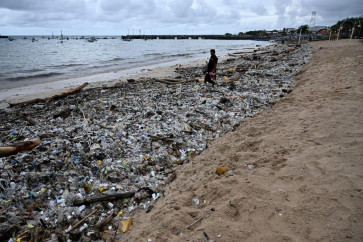Analysis: The importance of financial deepening in Indonesia
As one of the strongest emerging economies in the world, Indonesia is expected to have more sustainable economic growth
Change text size
Gift Premium Articles
to Anyone

As one of the strongest emerging economies in the world, Indonesia is expected to have more sustainable economic growth. One of the ways to achieve this is by constructing solid economic fundamentals by creating various instruments and products in the financial sector as well as creating an inclusive and liquid environment in all these products, widely known as financial deepening.
Financial deepening refers to the increased condition and amount of financial services, with broader alternatives of services that are accessible to every investor, foreign and domestic as well as retail and institutional. It also has greater macro effects on the economy as the liquidity and ratio of money supply to GDP is significantly increased.
Through comparative studies and success stories in other countries, financial deepening is shown to have a significant function in supporting economic growth, mitigating systemic risk, sustaining financial stability and trimming down poverty and inequality levels. When global volatility occurs, financial deepening can help to slow the effect and prohibit it from falling into a deeper crisis, as the market has a better structure and is built with better defense mechanisms.
Financial deepening will also create more even wealth and growth distribution. Better access to credit by the poor can reduce poverty by investing in human capital and micro-entrepreneurship. Broadening access to the financial sector and products could benefit the poor through increasing capital flow and allocation, thus gradually reducing inequality. Furthermore, financial deepening is needed to provide financing to the small & medium enterprises (SME) as a result of crowding out by large corporations. With a deeper financial sector, larger corporations can raise funding more easily through bonds and equity, so that banking can lend to SMEs.
Hence financial deepening plays a critical role, increasingly so with the new administration that is focusing on reallocating subsidies to human development through a social safety net, as well as ramping up infrastructure development. In order to finance such projects, GDP must be boosted to a certain level, so that it can support government budgeting without relying too much on government debt.
While it needs Rp 6.2 trillion (US$486 million) for poverty alleviation programs in 2015 (TNP2K), Indonesia also needs $450 billion to fund infrastructure spending from 2010-2020 (ADB). The current banking sector has a high loan to deposit ratio (LDR) and cannot meet these funding needs.
Financial deepening is very important for financial resilience. Comparing figures with Indonesia's emerging economic peers, Indonesia is still lagging behind with regards to the size of its capital market formation. It also shows that Indonesia has the shallowest penetration compared to its Asian counterparts. Compared to Malaysia and Thailand, Indonesia is 2.2 to 7.2 times smaller in term of listed companies and bond issuance amount from its neighbors. Compared to highly populated emerging countries such as India and China, retail investor rate is lower than one-tenth of the peers, showing that investment literacy is very low in Indonesia. The highest correlation of Indonesian market penetration is also still shallower than it should be.
To catch up with its peers, Indonesia needs accelerated transformation in capital and money markets to increase liquidity through more participation as its foremost barrier is the lack of structural investors in the Indonesian economy. Providing individuals, households and small firms with greater access to financial risk-managing tools can enhance resilience and stability of the real economy and thus also the financial system that serves it, according to an academic article published in 2012.
However it is also crucial to focus on the domestic demand side, as local participation will also reduce capital outflow and currency risks. With improved market stability, Indonesia will also become attractive to foreign investors looking to invest for long periods of time. Hence, it will also affect financial sustainability, market liquidity and risk mitigation. The achievement of this depends on how broad the access to financial services is and how it is administered by the supervisory and regulatory framework.
Government officials and regulators play significant roles in boosting financial deepening. Currently, there is an unfavorable tax environment in Indonesia for foreign companies and the absence of fiscal incentives for retail capital market investors. Through combined monetary, fiscal and public policies, they need to intensify the financial sector and reinforce continuous strategic plans to increase financial deepening and economic growth. This can be done through financial integration, relaxation or deregulation in paper work, limiting intervention in the financial system and speeding up the process of financial product issuance. High fixed costs in financial provisions also need to be cut to have a more efficient financial ecosystem.
The existing financial systems also need to develop financial markets, by increasing the status of financial institutions and creating diversified financial institutions as well as instruments. Financial products, especially for equity and bond products, should also be available for the domestic retail market; while it should be created at a higher scale, the minimum ticket allocation should still be affordable. There are several market instruments that also are not yet available or utilized in Indonesia, such as cross-currency swapping and an interest-rate swapping markets, asset-backed equity securitization and REITS (real estate investment trusts).
The financial sector has a well-established 'supply-leading' character; the level of financial development and stock market liquidity each exert an independent, positive influence on economic growth, according to a paper published in 1973. By building much needed financial services, economic growth will be stimulated through increasing the rate of capital accumulation, improving capital formation and efficiency (particularly more effective in low and middle income countries) and create greater ability to facilitate efficient resource allocation through a liquid trading platform and market.
___________________
The writer is a senior manager at Mandiri Institute, an independent research think tank of Bank Mandiri that focuses on public policy and the financial and banking sectors.









